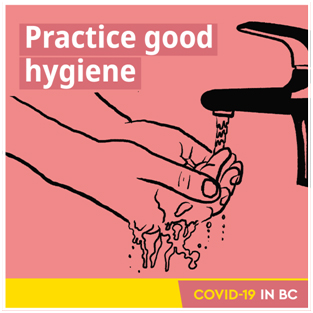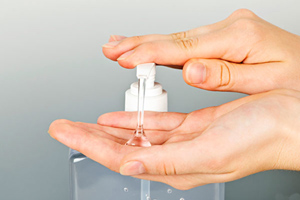
Wednesday November 16, 2022 | VICTORIA, BC [Updated November 17, 2022]
Editorial insights by Mary P Brooke, B.Sc. | Island Social Trends
Hand hygiene during the fall/winter respiratory season was highlighted several times in a livestreamed media update today by Provincial Health Officer Dr Bonnie Henry and Health Minister Adrian Dix.
That included Minister Dix saying to “wash hands with soap and water” and to “wash hands frequently”.
There was no mention of the use of hand sanitizers.
Hand washing has always been considered more effective (against viral spread) than alcohol-based sanitizers, but there was no direction from the top today to the many businesses, schools and community venues that have invested in providing hand-sanitizing stations.
Investment in hand sanitizers:
Upon the recommendation (and in some cases regulation) of the use of hand sanitizers, many businesses, schools, offices and public spaces in BC have made a significant investment in the installation and maintenance of hand sanitizing equipment since the start of the pandemic in winter/spring 2020.
Several pre-pandemic businesses that produced alcohol products (like wine) shifted over to producing hand sanitizer during the pandemic, in many cases heavily supported with funding from the BC government.
Many stores, restaurants and public venues still provide hand sanitizing stations. That was an additional cost during the pandemic, and will have added to maintenance budgets in businesses and schools.
It’s worth noting that many stores, restaurants and public venues have also still retained plexiglass barriers (in high traffic areas including checkouts) that were recommended by public health in 2020 (noting the effectiveness in reducing staff illness).
Guidance to businesses and operations:
The BC Ministry of Health points out that the BCCDC provides information for businesses and operations during the pandemic. As part of the prevention measures for all businesses, provision of alcohol-based hand rubs for patrons is recommended.
Here are the BCCDC hand hygiene recommendations for food-processing facilities.
Guidance to schools:
BC Centre for Disease Control public health recommendations for K-12 schools can be found online.

“Rigorous hand washing with plain soap and water or using an effective hand sanitizer reduces the spread of illness,” says the Ministry of Health.
“Everyone should practice diligent hand hygiene and schools should facilitate regular opportunities for students and staff to wash their hands,” it is stated by the BC Ministry of Health.
Alcohol content of sanitizers:

Washing your hands with soap and hot water for at least 20 seconds is most effective, says the BC Centre for Disease Control.
Washing hands regularly with soap and water for 20 seconds is recommended by health authorities, especially after going to the bathroom, before eating, and after coughing, sneezing, or blowing one’s nose.
The BC Centre for Disease Control says “one of the best things you can do to prevent infection is to wash your hands regularly and avoid touching your face“. Both those recommendations were repeated by Dr Henry today.
“While alcohol-based hand rubs can be used to disinfect your hands, washing your hands with soap and hot water for the appropriate length of time is most effective. This is because soap actively destroys the surface of the virus and really reduces how much of the virus is left on your skin,” says BC CDC.
Health Canada and the BC Centre for Disease Control recommend alcohol-based hand sanitizers for use in health care settings (at 70-90 per cent alcohol concentration).
Learn more about safely using hand sanitizer.
The FDA in the USA says to not use hand sanitizer if your hands are visibly dirty or greasy; wash your hands with soap and water instead.
“If soap and water are not available, the USA Centers for Disease Control and Prevention recommend using alcohol-based hand sanitizers containing at least 60% alcohol to help you avoid getting sick and spreading germs to others.”
Hand sanitizer safety:
In the early months of the COVID pandemic, there were reports of some children and adults ingesting hand sanitizer products, said the BC CEntre for Disease Control in a poison control news release in May 2020.
“Hand sanitizers have a high alcohol content and can cause alcohol poisoning if consumed in large enough amounts,” says BC CDC.
Absorption of alcohol through the skin is minimal but could be cumulative over time. While some studies have said the absorption is minimal and non-toxic to humans, the human liver does need to process any alcohol that is absorbed.
In 2021, the FDA in the USA posted a list of alcohol-based hand sanitizer products that are not recommended.
Normalization of alcohol intake:
Given the amount of alcohol that seems normalized in society (as a norm of social behaviour) the small amounts absorbed through use of hand sanitizer are fairly insignificant. But for people who choose a non-alcohol lifestyle, the use of hand sanitizers is introducing alcohol into their system.
Recently in Canada, the so-called socially normalized consumption of alcohol has been linked to higher incidence of cancers. Recent data shows that in 2017, alcohol use has led to over 18,000 deaths and 105,000 hospitalizations in Canada alone.
“Drinking any type of alcohol increases the risk of developing head and neck, breast, stomach, pancreatic, liver and colorectal cancers,” stated the Government of Canada and the Canadian Cancer Society in April 2022. The Canadian Cancer Society-funded ComPARe study found that if more Canadians limit their alcohol intake, about 44,300 cancer cases could be prevented by 2042.
Masks still recommended:
“Masks still need to be available and acceptable in workplaces,” said Dr Henry today, as she defended there being no need for a ‘heavy’ mask mandate.

The use of masks when appropriate was the overall recommendation she said, adding: “we are in a different place” compared to previous years of the pandemic. She and Minister Dix repeated the now common list of things to help prevent spread of respiratory viruses, including:
- wear a mask to protect self and others if someone in your household is not well, or if you’re in a crowded indoor space
- wash hands frequently
- follow respiratory etiquette (sneeze into elbow, dispose of tissues properly)
- stay home if you’re not well
The BC Green Party Leader Sonia Furstenau afterward asked for a mask mandate in BC, particularly in indoor public spaces including schools.
The BC Greens quoted a non-partisan health care expert, Dr Sanjiv Gandhi, Clinical Profesor of Surgery at UBC School of Medicine, Pediatric Cardiovascular and Thoacic Surgeon (former chief) at BC Children’s Hospital:
“The convergence of multiple respiratory pathogens and altered population immunity has resulted in a significant increase in viral infections in children across Canada. British Columbia is not exempt.”
“This is resulting in more sick kids,” said Dr Gandhi. “Some need to stay home from school, adding to parental pressures, some require medical attention, and some require hospital admission.”
“We must do whatever whatever is necessary now to change the trajectory,” he said, specifying that masking be required — not suggested — for use in public settings, schools, and on mass transit.”
Today Dr Henry mentioned people using their own common sense as to when and where to wear masks, including attention to ventilation and the size of indoor room spaces. Dr Gandhi stated about “deploying effective technologies to improve indoor air quality” as a necessary health measure.
Vaccinations important:
Today Dr Henry emphasized the importance of vaccination against COVID and influenza, as powerful tools against becoming infected and minimizing the impact of infection (reducing the incidence of sever illness, hospitalization or death).
Media update:
Today’s media update regarding COVID and respiratory illness in BC was the first in a long while, as noted by Dr Henry at the beginning of her livestreamed presentation to news media today.
===== LINKS:
Hand washing & hand sanitizers (BC Centre for Disease Control)
Learn more about safely using hand sanitizer (FDA)
COVID ARCHIVE (Island Social Trends)






